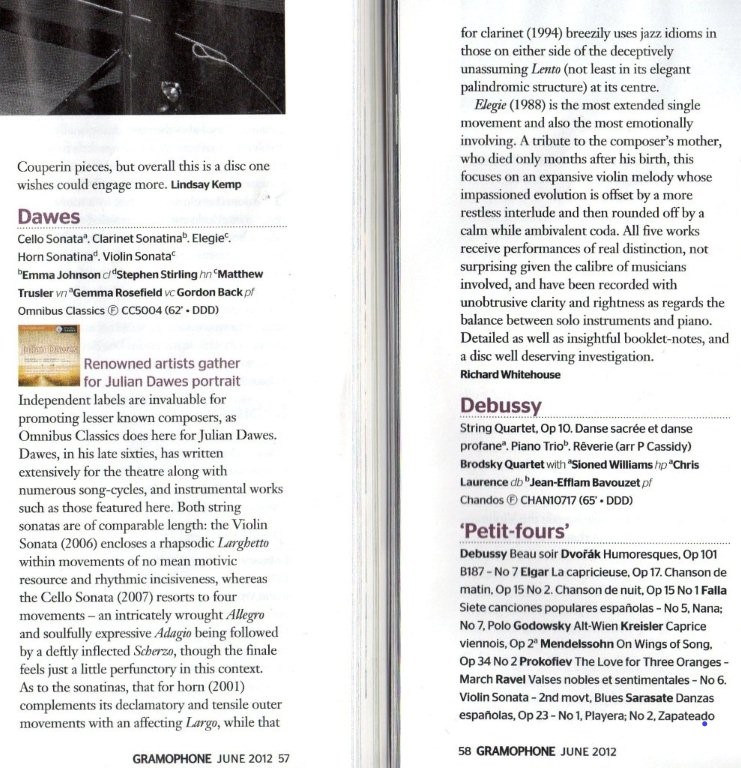Reviews
CD – Echoes of the Soul – Jewish Renaissance January 2019

CD – Julian Dawes Chamber Music – Gramophone Magazine June 2012

Concert – Songs of Ashes – Polish Embassy London – Musical Opinion June 2915
Concert – Shirat Hayam (Song of the Sea) – Musical Opinion
Shirat Hayam Musical Opinion
Concert – Wigmore Hall – December 2018
Shade and Nuance – Chamber music by Julian Dawes,
appreciated by MALCOLM MILLER
A world première of a compelling sonata for cello and piano played with passion and intensity by its dedicatee Gemma Rosefield with the eminent pianist Gordon Back formed the climax of the concert at London’s Wigmore Hall on 14 December 2008 featuring varied chamber works by Julian Dawes. The concert was both fascinating and full of interest and beauty, well displaying Julian Dawes’ individual voice, at once lyrical, pastoral and elegiac, yet also underpinned by a sturdy energy and wit, and at its most effective in a consolatory tenderness, as in the finale of the Cello Sonata, which Gemma Rosefield conveyed with eloquence and intensity. Her bold projection of the strongly melodic first movement, the intriguing variations of the slow movement and the lilting third movement made a persuasive case for this idiomatic addition to the cello repertoire.
The programme offered a fascinating sample of Dawes’ extensive creative oeuvre, which has found particular vigour in dramatic genres relating to solo voice, chorus or stage, and which, in his instrumental works, displays a lighter, theatrical and more abstract idiom. Alongside the English pastoralism deriving from Herbert Howells, the richness of Walton and the elegant delicacy of Berkeley, are the caustic irony of Shostakovich and Kurt Weill and the rhythmic impetus of Prokofiev and Stravinsky. His craftsmanship and characterful invention were evident in each of the works from the light jazzy humour of the Clarinet Sonatina, the expressive intensity of the violin Elegie and the exciting, often witty drama of the sonatas for Violin and Cello. With the immaculate artistry of Emma Johnson, Dawes’ Sonatina for Clarinet formed an ideal overture that sparkled and glistened with shade and nuance. From its jaunty opening theme shared by the two instruments to the jazzy finale which tickled the ear, the piece sustained interest with an especially affecting, evocative slow movement. Emma Johnson returned to give a ravishing account of the Saint-Saëns clarinet sonata — an autumnal work, in which the gentle first subject returns cyclically to close the piece, yet which contains some of the wittiest and tripping music in its Scherzo.
In Dawes’ two violin works, the meltingly expressive Elegy and the dramatic Sonata, the accomplished violinist Serena Leader drew long breathed lines, especially in the sonata’s slow, ground bass variation movement which well conveyed its meditative aura. Even more poignant was the Elegie in which Serena Leader’s plangent lyricism was supported by Gordon Back’s velvety yet penetrating pulsating chords, intensified in the more troubled central interlude. Throughout the evening, Gordon Back drew soft pastel shades from the piano, allowing the rich intriguing harmony full weight yet imbued with sensitive delicacy. The enthusiasm of the near capacity audience was rewarded with the second Dawes world première of the evening as encore, a delightful arrangement of a ‘Musette’ for all the performers, in which a lilting piano texture is overlaid by a delicate melody shared amongst the violin, clarinet and cello. Spiced with subtly-honed dissonances, it was an ideal miniature with which to conclude a fascinating window into an oeuvre which deserves wider familiarity.
Copyright © 27 December 2008 Malcolm Miller, London UK


